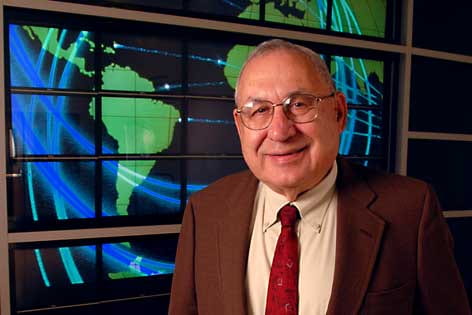Julian Feldman, Extraordinarius
His vision led to the 1968 creation of an information and computer sciences department, which he twice chaired and would become the first ICS school in the University of California system.

The term “founding father” gets used a lot and is often something of an exaggeration. But in the case of Julian Feldman, it hardly seems adequate to describe the impact he’s had on computing and education at UC Irvine.
Feldman, who received the UCI Alumni Association’s Extraordinarius award on Thursday, May 13, left a tenured position at UC Berkeley in 1964 to join the original faculty of 25 at the fledgling campus.
It was his vision that led to the 1968 creation of an information and computer sciences department, which he twice chaired and would become – nearly four decades later – the first ICS school in the University of California system.
The Extraordinarius award recognizes an individual who has prominently contributed to the UCI campus and exemplifies the spirit and purpose of the university. Past winners include Daniel G. Aldrich Jr., Arnold O. Beckman, Athalie R. Clarke, Carol Cicerone, R. Duncan Luce, Jack and Suzanne Peltason, James McGaugh, Howard Schneiderman, William R. Schonfeld and Joseph L. White.
Debra Richardson, dean of the Donald Bren School of Information & Computer Sciences, calls Feldman “a beacon in every role he’s undertaken – teacher, mentor, researcher and administrator. He was instrumental in the development of UCI’s special history in the field of information and computer sciences.”
From 1969 to 1976, Feldman was the campus’s inaugural assistant chancellor for computing, a precursor to today’s position of assistant vice chancellor for information technology. In that role, he oversaw campuswide computer resources, procuring state-of-the-art technology that facilitated both research and education.
By the end of the 1960s, UCI’s ICS program was one of only a handful in the country offering graduate coursework in artificial intelligence – a decade ahead of most universities. Such forward-thinking innovations by Feldman won the young campus national recognition.
“Julian played such a vital role in helping UCI achieve its top-50 status as a research university in the early years,” says Thomas Standish, ICS professor emeritus. “He convinced UCI leaders of the value of computer science at a time when many didn’t think it was a science at all.”
Feldman, one of 18 awardees who’ll be honored at the UCIAA’s annual Lauds & Laurels ceremony, graduated from high school during his junior year and was accepted directly into the University of Chicago. As a senior there, he got a perfect score on the GRE, then earned a master’s in political science before pursuing a doctorate at Carnegie Mellon University’s Graduate School of Industrial Administration.
“GSIA was established shortly after World War II, and it was still a very young and very small school when I arrived in fall 1956,” Feldman says. “Carnegie’s first computer arrived at the same time I did. I found it a very exciting environment: interesting research, great teachers, good student colleagues, great interactions. At UCI, I had the chance to participate in developing a similarly young campus.”
More than 40 years later, the ICS professor emeritus still has an office in Bren Hall and remains passionate about supporting the program he began, volunteering to help wherever he’s needed most.
“Julian has dedicated his life’s work to furthering the education of many and bringing respect and recognition to UCI,” says Richardson. “He epitomizes the spirit of the Extraordinarius award.”
Jorge E. Ancona, assistant vice chancellor for alumni relations, agrees: “We’re honored to be able to acknowledge Julian’s outstanding service to the university and the greater community. There’s no denying his academic and administrative accomplishments, but his greatest legacy is the profound impact he’s had in the lives of his students and colleagues.”